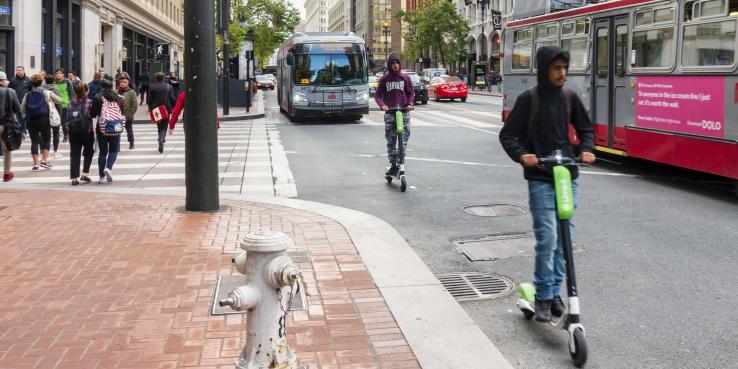Over the past decade, transportation has gone through a profound change. Enabled by smartphones, powered by billions in venture capital, and exploiting huge inefficiencies in or transportation system, new forms of shared mobility have seen explosive growth. From ride-hailing services like Uber and Lyft to bike-sharing, e-scooters, carpool apps and car-sharing, these services have proved invaluable to help many people get where they need to go quickly, cheaply and reliably.
But as these services grow, can we shape and harness them to create a mixed-mobility future — one where we reduce dependency on cars, cut down climate emissions, lower demand for parking and create more livable cities? Or will this revolution, led by the private sector and focused on financial returns, lead to yet more reliance on cars, greater inequality and other outcomes we are trying to avoid?
For the past few years, the public sector has focused on both regulating these services and trying to adapt some of the new technologies. But with 27 transit operators and 101 cities in the Bay Area, there has been little coordinated action. The public sector has been rigid and slow to adapt, hobbled by institutional inertia.
Now, both the public and private sectors are being upended by the COVID-19 pandemic.
Transit is in a tailspin. Ridership and fares have plummeted by 90 percent or more at most agencies, along with funding from sales taxes and other sources. Muni, AC Transit and others are projecting that dozens of transit lines will be cut. At the time of this writing, the very existence of Caltrain is under threat.
The private sector, too, is taking a hit. Revenues for Uber and Lyft are plummeting as they try to assure riders of safety. Shared bikes and scooters can be an incredible part of the solution in the short- and long-term, yet they have never had a sustainable business model, their venture capital is drying up and they are facing new costs for cleaning in the era of COVID-19. Ultimately, laws like AB 5, which seeks to regulate gig work, may have an even bigger impact.
Into this maelstrom of change, SPUR is releasing a new report, The Future of Transportation. The report describes how public transportation and private emerging mobility providers can play to their respective strengths, function as a seamless network, and provide access for people of all incomes, races, ages and abilities. To do that, the Bay Area will need to implement a host of the recommendations in the report, and do them with a real urgency.
We offer 13 recommendations. Here are the highlights:
Reinvent transit agencies to focus on the customer
Transit agencies need to move away from a service vision organized around a single travel mode and toward integrated planning that is focused on the customer. We see this in agencies like LA Metro and Seattle’s King County Metro. This shift will require changing a culture typically resistant to change into one willing to embrace risk and experimentation and to learn from failure. These changes could spur innovative new partnerships between the public sector and private companies focused on filling gaps in the transportation system. The public sector could consider subsidizing these services or creating public versions of them to improve access and diversify their offerings.
Launch a Bay Area Mobility Innovation Lab to pilot collaborations between the private and public sectors
The region needs to avoid the same fragmentation that has hurt its transit system. SPUR believes that the Metropolitan Transportation Commission (MTC) should play a more prominent role. We also recommend the creation of a new entity we would call the Bay Area Mobility Innovation Lab, which would, in collaboration with MTC, support and fund pilots, partnership and experimentation, support workforce development and more.
Create a Safety Net Mobility Package to help low-income riders afford trips of all types
Finally, this isn’t about technology or pilot projects. It’s about people. As the number of COVID-19 cases was escalating, the nation was hit with another crisis. Protests over the horrific and senseless death of George Floyd began awakening the country to the systemic racism entrenched in our society. An inequitable transportation system — focused on moving car commuters quickly at peak hours — is just one more way that communities impacted by systemic racism have been marginalized and disproportionately burdened. With transit lines about to be cut, the region may once again fail communities of color, immigrants, people with different abilities and low-income residents.
That is why MTC should build on the important work it is coordinating with its means-based transit fares and create a Safety Net Mobility Package. This would be a single account or “mobility wallet” that low-income riders could use to pay for public transit trips, as well as trips on private mobility providers. It could help solve the transportation needs of individuals and communities that need it most.
An uncertain future requires flexible solutions
We don’t want to underplay the difficulty of this task. Private mobility companies keep changing and going out of business, and models evolve within a year. Government agencies are in crisis, and that will make it even harder to respond effectively. And yet, the emergence of slow streets, miles of new transit only lanes and complete transit system redesigns demonstrate that flexibility and innovation are well within the reach of cities and transit agencies.
In the months ahead, SPUR will work with transportation partners and the community to ensure the public sector plays this active role while also harnessing the creativity, resources and innovation of the private sector. Together we can create a transportation system with significantly fewer car trips, lower greenhouse gas emissions, improved quality of life and increased access and affordability for the region’s most vulnerable residents.
